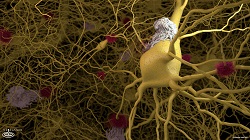An active immunotherapy against neurodegenerative disorders
PD and MSA, also known as alpha-synucleinopathies, are two debilitating neurodegenerative disorders associated with a progressive decline in motor functions, autonomic disorders, as well as behavioural changes. MSA progresses very rapidly with patients dying within 10 years of disease onset. Emerging evidence indicates that neurodegeneration in PD and MSA is associated with the formation of Lewy bodies in brain neurons and glial cells. Lewy bodies are primarily composed of aggregates of the protein alpha-synuclein, whose main function is to facilitate release of neurotransmitters required for neuronal transmission. Given the role of alpha-synuclein in disease pathophysiology, scientists of the EU-funded SYMPATH project tested a novel specific active immunotherapy (SAIT) approach to target it. ‘Directing the immune system towards neurodegenerative diseases constitutes an innovative approach that potentially has the capacity for reducing disease progression,’ explains project coordinator Dr Galabova. An innovative α-synuclein–specific active immunotherapy The SYMPATH project tested an innovative methodology based on the novel AFFITOPE® technology, which relies on short peptides mimicking parts of the native sequence or structure of alpha-synuclein. ‘PD01A and PD03A were designed to elicit antibodies neutralising the toxic form of alpha-synuclein but sparing compensatory beta-synuclein, thereby adding to their safety,’ continues Dr Galabova. Pre-clinical evaluation demonstrated the disease-modifying activity of these SAIT candidates in various models. Treated animals exhibited lower cerebral levels of aggregated protein, less severe neuropathological alterations and improvements of functional deficits. As a result, the next step was to forward the SAIT for clinical production and testing in patients. Successful completion of two phase I clinical trials in early PD and MSA patients demonstrated the safety profile of the PD01A and PD03A AFFITOPEs. For the future, researchers envisage ‘selection of the most suitable candidate based on defined criteria, and furthermore, bringing this compound into the next step of clinical development.’ The collection of data and biological material from patients suffering from PD and MSA, who received α-synuclein specific immunotherapeutic intervention, will be instrumental in the design of the next clinical study. The latter will focus on defining the precise dosage and schedule for SAIT treatment in PD and MSA patients. The future of neurodegeneration treatment With the ageing population rapidly increasing, there is great concern regarding the provision of healthcare for the elderly. Therefore, innovative treatments are urgently needed to address age-related diseases like neurodegeneration and cancer. At the same time, it is necessary to identify patients as early as possible and initiate treatment before damage becomes irreversible. Towards this goal, part of the SYMPATH project was devoted to the identification of biomarkers with diagnostic and prognostic value. The team developed an alpha-synuclein detection assay to diagnose protein aggregation in plasma and cerebrospinal fluid, and assist in the assessment of therapy response in the future. Considering the millions of alpha-synucleinopathies sufferers worldwide who receive only palliative symptomatic treatment, there is an imminent need for causative treatment approaches. Strategies targeting alpha-synuclein might be a possibility to address this unmet medical need.
Keywords
SYMPATH, vaccine, AFFITOPE, alpha-synuclein, Parkinson’s disease, multiple system atrophy, active immunotherapy







